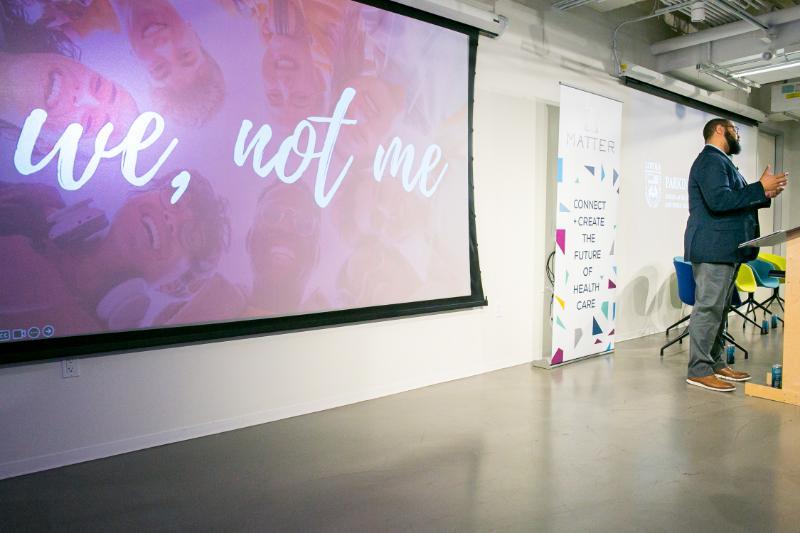Health-EQ Call for Proposals

Due Date: April 30, 2021
The mission of the Health EQ Collaborative is to reduce health inequalities in the Chicago area.
To reach our vision of a more just society, we are soliciting proposals aiming to reduce health inequalities, and focused on either 1. Community Engagement / Partnership; 2. Education; or 3. Research. The 3 categories for this RFP are equally important, and we hope to fund projects in all of them.
Below are examples of what has been or could be funded under each specific theme. These are by no means exhaustive. They are provided as examples for each category. Reach out to Kathleen Bobay (kbobay@luc.edu) if you are unsure whether your project fits with the Health EQ initiative.
Community Engagement / Partnership
- Development of a Women in Science Community to reduce gender disparities in science, creating role models, and nurturing talent among women, in particular in underrepresented groups
- Development of a culturally-sensitive physical activity program for the elderly in the Maywood area, to motivated and engage older adults to move, and to reduce social isolation
Education
- Creation of a Bachelor of Science in Public Health with an emphasis on health inequities and social justice to increase the understaffed health care workforce in the Chicagoland
- Creation of a certificate in implementation science, which addresses issues relevant to health disparities, social justice, and health communication pertaining to underserved populations
Research
- Omics integration in populations of African ancestry to understand mechanisms underlying obesity and cardiovascular disease
- Assessing the efficacy/effectiveness of technology to improve the management of hypertension among underrepresented groups
The committee will entertain proposals up to $50,000 for a period of one year, starting July 1, 2021. The committee will attempt to fund at least one proposal in each category. The deadline for full proposal is April 30, 2021, 5p.m. CT.
Funding is limited. The budget must be accurate, conservative, and carefully reflective of the work. No cost extensions are allowed under this funding mechanism, and funds have to be spent during the fiscal year. Funds may not be used to cover Faculty salary. The proposal is to be single spaced, no more than seven pages (11 pt. font, Times New Roman), not including references, budget and appendices. Funding is competitive; this invitation does not guarantee funding.
Community Engagement/Partnership and Education Proposals Should Address and Include the Following Components:
- Project/Program Title: does the title accurately reflect the project/program being proposed?
- Impact on Reducing Health Disparities: will this project/program fill a gap in health equity?
- Problem Statement: describe the problem, why it is a problem, and who is impacted by the problem. What specific elements of the problem is your project/program trying to address? Include enough background to allow assessment of problem. (1/2 page)
- Project/Program Objectives: are your project/program objectives achievable? Measurable? (1/2 page)
- Project/Program Scope and Approach: what is the scope of your project? Provide a clearly articulated plan for the initiation, conduct of your project/program, as well as your plan for monitoring and evaluating the outcomes. Include the proposed activities, description of the population/community/target audience, and timeline. (4 pages)
- Anticipated Outcomes/Sustainability: describe what the outcomes of your project/program will be and how they will address the problem described in your problem statement. Describe the vision for long-term sustainability. (1 page)
- Team description and collaborative plan (1 page)
- Budget
- References
Research proposals should address and include the following components:
- Project/Program Title: does the title accurately reflect the project/program being proposed?
- Impact on Reducing Health Disparities: will this project/program fill a gap in health equity?
- Specific Aims (1 page)
- Research Plan (4 pages)
- Significance
- Innovation
- Approach
Note: significance must be addressed specifically in the context of health inequities.
- Anticipated Outcomes: describe the importance of the data collected to seek external funding to federal agencies, and specific funding mechanisms you will target. (1 page)
- Team description and collaborative plan (1 page)
- Budget
- References
Please submit the full proposal via e-mail to Kelly Quinn by April 30, 2021, 5 p.m. CT. Questions can be directed to Kathleen (Kathy) Bobay.
